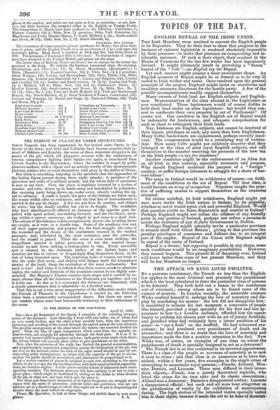TOPICS OF THE DAY.
ENGLISH REPEAL OF THE IRISH UNION.
THE Irish Members seem resolved to convert the English people to be Repealers. They do their best to show that progress in the business of rational legislation is rendered absolutely impossible by their presence—to make that presence an exasperating and in- tolerable nuisance. If such is their object, their conduct in the House of Commons for the last few weeks has been ingeniously devised. It might ultimately result in provoking a " Saxon " hatred of the "Celt "—an English cry for Repeal. Yet such success might assume a most unwelcome shape. An English measure of Repeal might be so formed as to be very ill suited to Irish wishes and tastes. Once resolved upon the general principle of the project, England might insist on conditions and auxiliary measures disastrous for the hostile party. A few of the possible accompaniments readily suggest themselves. Many owners of Irish land are English subjects and English- men. Representatives of the class abound in the Legislature as now constituted. Those landowners would of course dislike to hold their land under an alien legislature : but would they con- sent to confiscate their own property by act of Parliament! Of course not. One condition in the English act of Repeal would be indemnity for landowners, and adequate compensation for such as chose to relinquish their Irish lands. Nay, Irishmen are English subjects, and cannot be deprived of their innate privileges as such, any more than born Englishmen. Many Celtic landowners are embarrassed, perhaps secretly insol- vent. The compensation would be a promising way of extrica- tion. How many Celts might not suddenly discover that they belonged to the class of most loyal English subjects, and add themselves to the number receiving the proceeds of the new tax on the Irish people—a taxfor absentees? Another condition might be the enforcement of an Alien Act on all Irish in this country, especially recusants and paupers. Why should England maintain the paupers of a " foreign " country, or suffer foreign labourers to struggle for a share of har- vest-labour 1' The army in Ireland would be withdrawn of course—on fulfil- ment of the conditions to the act of Repeal. Till that time, it would become an army of occupation. Napoleon taught the prac- tice of suffering armies to support themselves on the countries occupied. Its ,claims satisfied, its hold withdrawn England might yet once more invite the Irish nation to declare, by its majority, whether or not it would rejoin rich and powerful England. Would that question excite no fierce disputation and contest in Ireland! Perhaps England might not refuse the alliance of any friendly party in any portion of Ireland, perhaps not refuse a promise to accept the overtures of any tk facto Government in Dublin. Perhaps England might specially invite a particular province to reunite itself with Great Britain ; giving to that province the peculiar privileges of commerce and defence due to an integral part of the empire. Repeal of the Union with England might be repeal of the unity of Ireland. Repeal is a dream; but supposing it possible in any shape, some such conditions would be no imaginary possibilities. However, they cannot happen. This present fit of dreaming over, Ireland will know better than some of her present Members, and they will be her Members no longer.


























 Previous page
Previous page